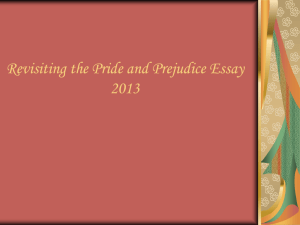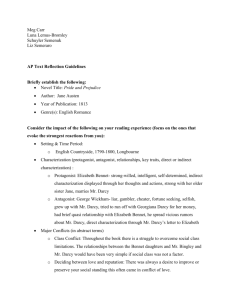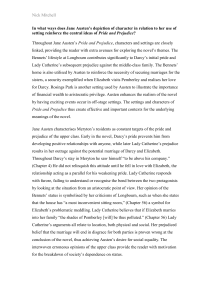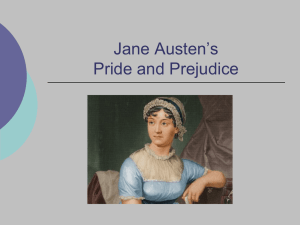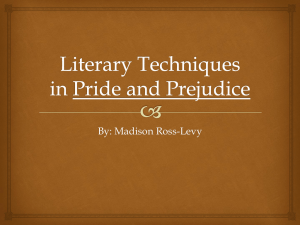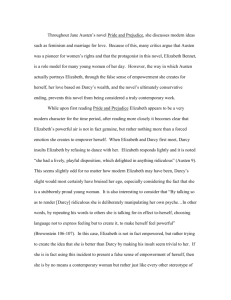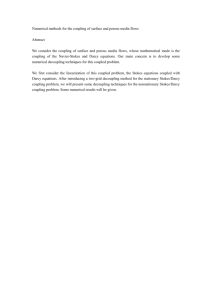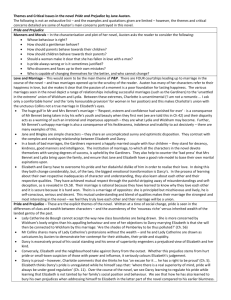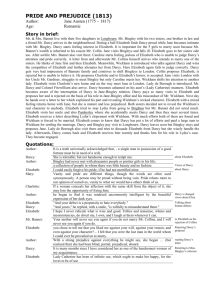Sample response P and P
advertisement
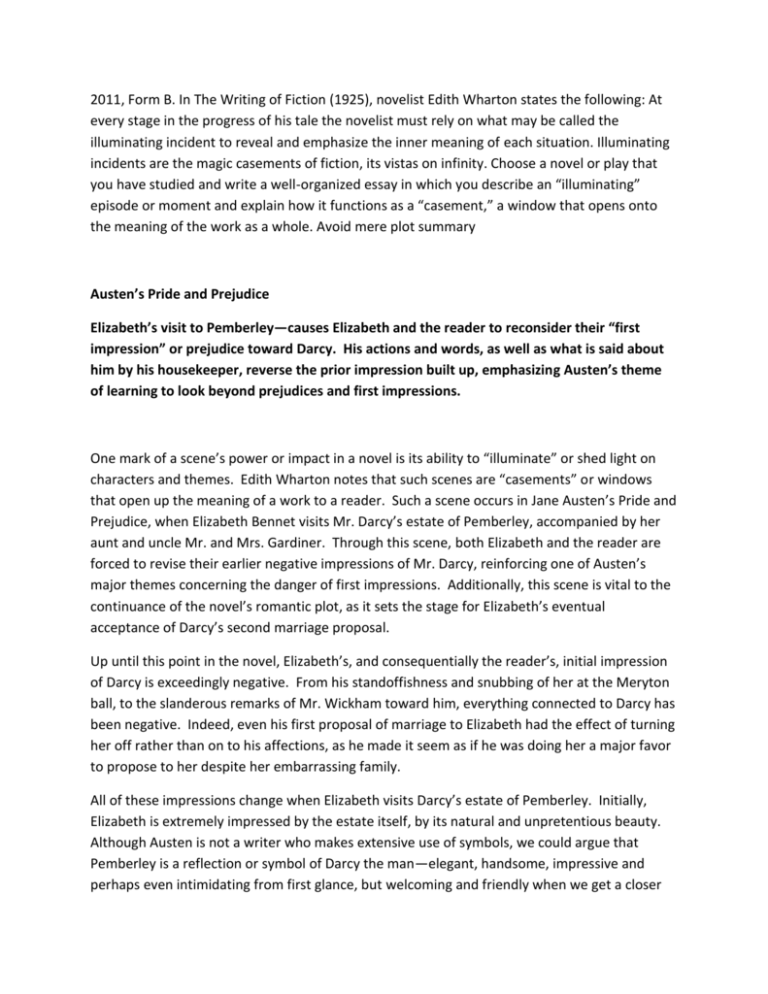
2011, Form B. In The Writing of Fiction (1925), novelist Edith Wharton states the following: At every stage in the progress of his tale the novelist must rely on what may be called the illuminating incident to reveal and emphasize the inner meaning of each situation. Illuminating incidents are the magic casements of fiction, its vistas on infinity. Choose a novel or play that you have studied and write a well-organized essay in which you describe an “illuminating” episode or moment and explain how it functions as a “casement,” a window that opens onto the meaning of the work as a whole. Avoid mere plot summary Austen’s Pride and Prejudice Elizabeth’s visit to Pemberley—causes Elizabeth and the reader to reconsider their “first impression” or prejudice toward Darcy. His actions and words, as well as what is said about him by his housekeeper, reverse the prior impression built up, emphasizing Austen’s theme of learning to look beyond prejudices and first impressions. One mark of a scene’s power or impact in a novel is its ability to “illuminate” or shed light on characters and themes. Edith Wharton notes that such scenes are “casements” or windows that open up the meaning of a work to a reader. Such a scene occurs in Jane Austen’s Pride and Prejudice, when Elizabeth Bennet visits Mr. Darcy’s estate of Pemberley, accompanied by her aunt and uncle Mr. and Mrs. Gardiner. Through this scene, both Elizabeth and the reader are forced to revise their earlier negative impressions of Mr. Darcy, reinforcing one of Austen’s major themes concerning the danger of first impressions. Additionally, this scene is vital to the continuance of the novel’s romantic plot, as it sets the stage for Elizabeth’s eventual acceptance of Darcy’s second marriage proposal. Up until this point in the novel, Elizabeth’s, and consequentially the reader’s, initial impression of Darcy is exceedingly negative. From his standoffishness and snubbing of her at the Meryton ball, to the slanderous remarks of Mr. Wickham toward him, everything connected to Darcy has been negative. Indeed, even his first proposal of marriage to Elizabeth had the effect of turning her off rather than on to his affections, as he made it seem as if he was doing her a major favor to propose to her despite her embarrassing family. All of these impressions change when Elizabeth visits Darcy’s estate of Pemberley. Initially, Elizabeth is extremely impressed by the estate itself, by its natural and unpretentious beauty. Although Austen is not a writer who makes extensive use of symbols, we could argue that Pemberley is a reflection or symbol of Darcy the man—elegant, handsome, impressive and perhaps even intimidating from first glance, but welcoming and friendly when we get a closer look. While visiting the estate, Elizabeth gets to meet Darcy’s housekeeper, a woman who has known him from boyhood. She speaks glowingly of him and details how he is extremely fair and kind to all who live and work on the estate. As Elizabeth listens, we can see her mind starting to change its impression of Darcy, influenced by this woman who has known him for a long time. Her impression of Darcy improves even further when he surprisingly appears in the scene. The fact that his appearance is unexpected, much like his surprising Elizabeth with his first marriage proposal, makes this scene a natural contrast to Elizabeth’s encounter with Darcy at Rosings. In this instance, contrary to their prior encounters, Darcy is warm and cordial. He takes time to converse with the visitors, and is especially gracious toward the Gardiners, a sharp contrast from his prior comments and treatment of Elizabeth’s family. Once again, as is characteristic of Austen’s writing style, we get to “hear” Elizabeth’s impressions of Darcy as they are changing. So much of the drama and conflict of this novel stems from mistaken impressions and miscommunications. Austen uses numerous instances where characters are mistaken about each others true natures or feelings in order to critique her society’s prioritizing of appearances over essential nature. The visit which Elizabeth makes to Pemberley serves as a strong turning point for Elizabeth, as it opens her eyes, and those of the reader, to another side of Darcy’s character. It is interesting to note that Austen’s original title for the novel was First Impressions, and much like her famous opening line that “It is a truth universally acknowledged that a single man in possession of a good fortune must be in want of a wife,” the original title was rife with irony and satire. Austen wanted her readers to realize the dangers of first impressions and prejudices, and to accomplish this goal she needed to write scenes such as the visit to Pemberley to serve as windows to show the characters and readers how wrong those impressions were.
